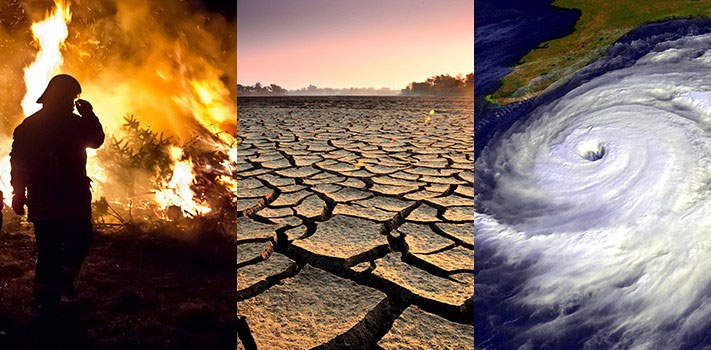Earth is hot record, but the next 5 years will be even hotter
Earth is heating up, there are years breaking many records. But things have not stopped.
In recent years, the heat on Earth has broken many records. The winter was terribly cold, the scorching heat of the summer, how much people suffered.
But it hasn't stopped yet. According to a recent study, the huge possibility is that in the next years, our Earth will be even hotter. At the same time, the risk of heat shock episodes somewhere in the oceans, causing the ice to melt and destroy the coral will also spike.
"It seems that in the next 5 years, it is likely that there will be extreme heat and cold waves constantly appearing" - quoted Florian Sevellec, a researcher at the French National Research Center and co-author of the study. assist.

The great possibility is that in the next years, our Earth will be even hotter.
What is Earth warming up?
First of all, it is important to understand that the Earth is heating up , but that does not mean that the following year will be hotter than the previous year. Exactly that is a trend over a decade - as the period after 2010 will be hotter than the previous period. And in addition, there will be specific years where heat levels are rated as peaks.
One of the important factors to assess the temperature for scientists is the "intrinsic variable" - changes caused by the Earth itself, not necessarily from the amount of greenhouse gases.
For example, in the 2000s, global warming was interrupted by internal variables. For example, heat fluctuations in the ocean keep the Earth from rising too much.
But according to the new study, intrinsic variables are now doing the opposite, ie Earth's reaction chains are causing faster heating rates, even when we no longer produce house gas. glasses.

Earth's reaction sequences are causing faster warming.
Specifically, experts from the University of Southampton (UK) used data from more than 10 climate change models. In it, they use a lot of natural and human variables, then use emulators to see how they will change in the next years.
As a result, the model assumes that there will be 58% of the Earth's overall thermal background capacity from 2018-2022 will increase dramatically. For oceans, thermal shock capacity will be 69%, with increased heat levels going to be around 400% compared to the present.
In 2018, the Earth's climate also shows a hotter trend. Although not yet reached the record threshold, but also ranked 3rd among the hottest years when compared to the period 1951-1980.
Of course, it is still too early to talk about the specific trend of the year. According to NASA data, 2016 is the hottest year in history, followed by 2017, 2015 and 2014. But anyway, this is still a worrying study, and has made scientists look at it. more realistic about the climate of Earth warming.
- In the next 3 months, it is hotter every year
- Looking at the heat map of Europe now is enough for everyone to tremble
- Europe faces a record heat wave
- Travel to the Arctic in ancient times 55 million years ago
- Close record of Jupiter-Earth: September 20, 2010
- 7 changes if the Earth gets hotter
- Concentration of CO2 in the atmosphere increased the record in the past 800,000 years
- New discovery of the heat of Earth's core coating
- Hot air balloon set a record for altitude
- World record: Planting 66 million trees within 12 hours
- Speed record car power has been broken
- Suicides in the US and Mexico increased because of the hotter weather
 Is the magnetic North Pole shift dangerous to humanity?
Is the magnetic North Pole shift dangerous to humanity? Washington legalizes the recycling of human bodies into fertilizer
Washington legalizes the recycling of human bodies into fertilizer Lightning stone - the mysterious guest
Lightning stone - the mysterious guest Stunned by the mysterious sunset, strange appearance
Stunned by the mysterious sunset, strange appearance